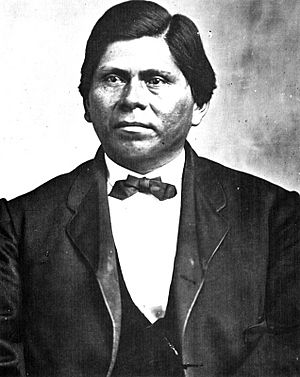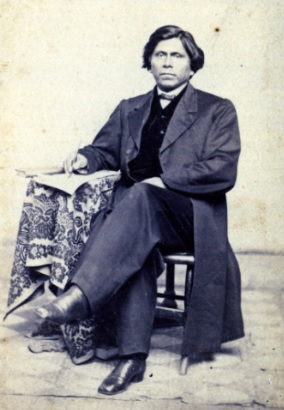Allen Wright facts for kids
Quick facts for kids
The Reverend
Allen Wright
|
|
|---|---|
| Kiliahote | |
 |
|
| Chief of the Choctaw Republic | |
| In office 1866–1870 |
|
| Preceded by | Peter Pitchlynn |
| Succeeded by | William Bryant |
| Personal details | |
| Born |
Kiliahote
November 1826 Attala County, Mississippi |
| Died | December 2, 1885 Boggy Depot, Indian Territory |
| Nationality | Choctaw |
| Political party | National Party |
| Occupation | Minister, warrior, politician |
| Known for | Coined the name "Oklahoma." Served as Principal Chief of Choctaw Nation, 1866-1870 |
| Military service | |
| Allegiance | |
| Branch/service |
|
| Years of service | 1861–1865 (C.S.) |
| Rank | Chaplain |
Allen Wright (whose Choctaw name was Kiliahote) was an important leader of the Choctaw Nation. He was their Principal Chief from 1866 to 1870. He was born in November 1826 and passed away in December 1885.
Allen Wright was also a Presbyterian minister. He became a minister in 1852 after studying at Union Theological Seminary in New York City. He was very involved in the Choctaw government. He held many important jobs that he was elected to.
He is famous for suggesting the name Oklahoma for the land that later became the state. "Oklahoma" is a Choctaw word meaning "Home of the Red Man." After fighting in the Confederate Army during the Civil War, Wright was chosen as Principal Chief. He helped sign the Reconstruction Treaty of 1866. This treaty helped bring peace with the United States again. From 1880 to 1884, Wright also worked as the superintendent of schools for the Choctaw Nation.
Contents
Growing Up: Allen Wright's Early Life
Allen Wright was born Kiliahote in November 1826. This was in Attala County, Mississippi, which was part of the Choctaw Nation at the time. His Choctaw name, Kiliahote, means "Come, let’s make a light."
His mother, who was full-blood Choctaw, died in 1832. In 1833, his father and the rest of his family moved from Mississippi. They settled in what is now McCurtain County, Oklahoma, in 1834. This move was part of the forced Indian Removal by the U.S. government.
After his father died in 1839, Kiliahote was cared for by Reverend Cyrus Kingsbury. He attended a mission school at Pine Ridge. The Presbyterian missionaries gave him his English name, Allen Wright. They chose "Wright" to honor Reverend Alfred Wright, another well-known missionary to the Choctaw people.
After four years, Wright went to Spencer Academy. This was the main school for the Choctaw tribe. He studied there from 1844 to 1848.
Kiliahote grew up following Choctaw traditions. He also learned about Christianity from missionary teachers. In 1846, at age 20, he joined the Presbyterian Church. He later decided he wanted to become a minister.
Allen Wright's Education Journey
Allen Wright was one of four students chosen by the Choctaw Council. They were sent to attend college in an eastern state of the United States. Wright first went to Delaware College in Newark, Delaware, from 1848 to 1850.
When that school closed, he enrolled at Union College in Schenectady, New York. He earned a Bachelor of Arts degree there in July 1852. In September 1852, Wright began studying at Union Theological Seminary in New York City.
He earned a Master of Arts degree in Theology in May 1855. He was the first Native American student from Indian Territory to earn this advanced degree. After finishing seminary, he became an ordained minister in the Presbyterian Church.
He returned to the Choctaw Nation in 1855. He became the main teacher at Armstrong Academy. This was a school for Choctaw boys run by Presbyterian missionaries.
Family Life and Connections
On February 11, 1857, Allen Wright married Harriet Newell Mitchell. She was a European-American woman from Ohio. She had come to the Choctaw Nation in 1855 as a missionary. The couple had eight children together.
One of their sons, Eliphalet Nott Wright, became a medical doctor. He later served as president of the Choctaw Oil Company. One of their granddaughters was Muriel Hazel Wright. She became a famous Oklahoma author and historian.
Political Career and Civil War Service
Wright became a member of the Choctaw Council in 1856. He was elected treasurer of the Choctaw Nation in 1859. In 1861, he was elected to the Choctaw Council again. He served two terms in the Choctaw House of Representatives. He also served three terms as the nation's treasurer.
Wright was one of the people who signed a treaty in 1861. This treaty made the Choctaw Nation allies with the Confederate States of America. The Choctaw and other tribes hoped the Confederacy would help them create a Native American state if they won the war. Wright then joined the Confederate Army.
He joined Captain Wilkin's Company of Choctaw infantry in July 1862. In June 1863, he transferred to Company F of the Choctaw and Chickasaw Mounted Rifles. When the war ended, Choctaw Chief Peter Pitchlynn sent him to a conference. There, an agreement was signed with the United States.
After the Civil War: Chief and Translator
Wright was elected Principal Chief of the Choctaw Tribe in 1866. He served in this important role until 1870. His excellent education helped him achieve many things, including:
- Translating laws of the Chickasaw Nation from English into Chickasaw.
- Creating a Choctaw dictionary for use in tribal schools.
- Translating the Book of Psalms (from the Bible) from Hebrew into Choctaw.
Wright knew many languages. Besides his native Choctaw, he spoke English, Greek, Latin, and Hebrew.
Wright represented the Choctaw Nation at the Fort Smith Council. He signed the Reconstruction Treaty of 1866. During this time, U.S. officials suggested uniting all the Indian Territory tribes under one council. Wright was the one who suggested the name Oklahoma for the territory.
In 1885, Wright worked as an editor and translator for the Indian Champion newspaper. He was also a founding member of the first Masonic lodge in Indian Territory. He had joined the Royal Arch Masons in Maryland in 1866.
Wright served as superintendent of schools for the Choctaw Nation from 1880 to 1884.
Later Years and Legacy
Allen Wright died in Boggy Depot, Indian Territory, on December 2, 1885. He had been traveling to spread the Gospel. After having to swim a river, he became sick with pneumonia. He was buried in the Boggy Depot cemetery. His wife, Harriet, passed away on December 25, 1894, in Atoka. She was buried next to him in Boggy Depot.
Images for kids
 | Selma Burke |
 | Pauline Powell Burns |
 | Frederick J. Brown |
 | Robert Blackburn |




